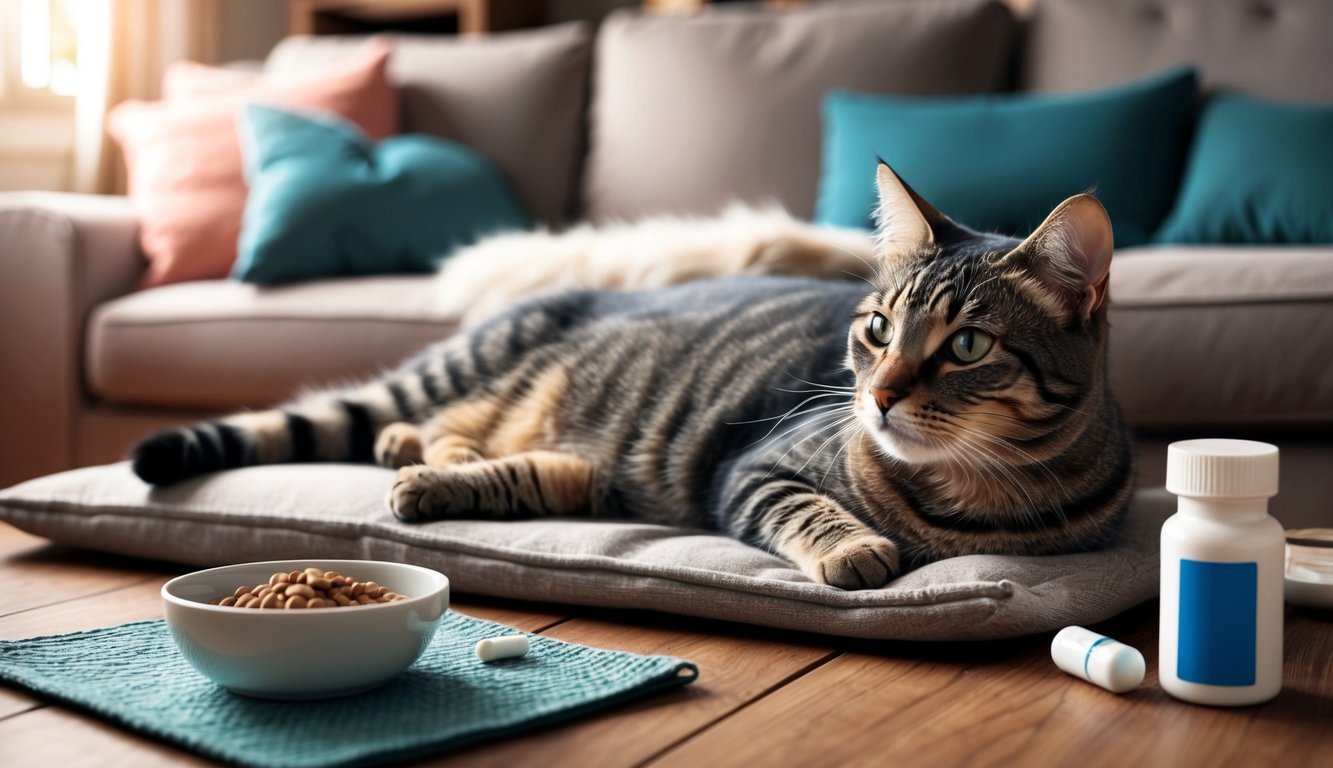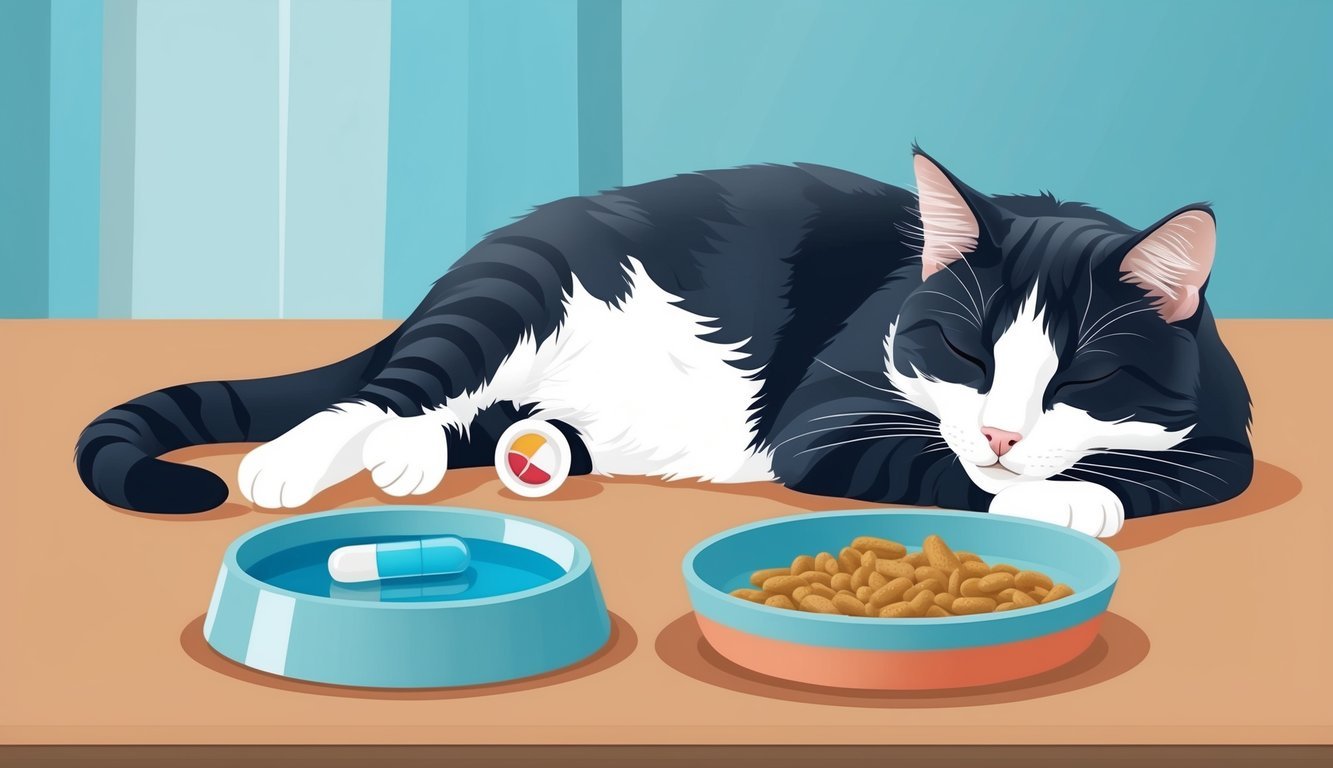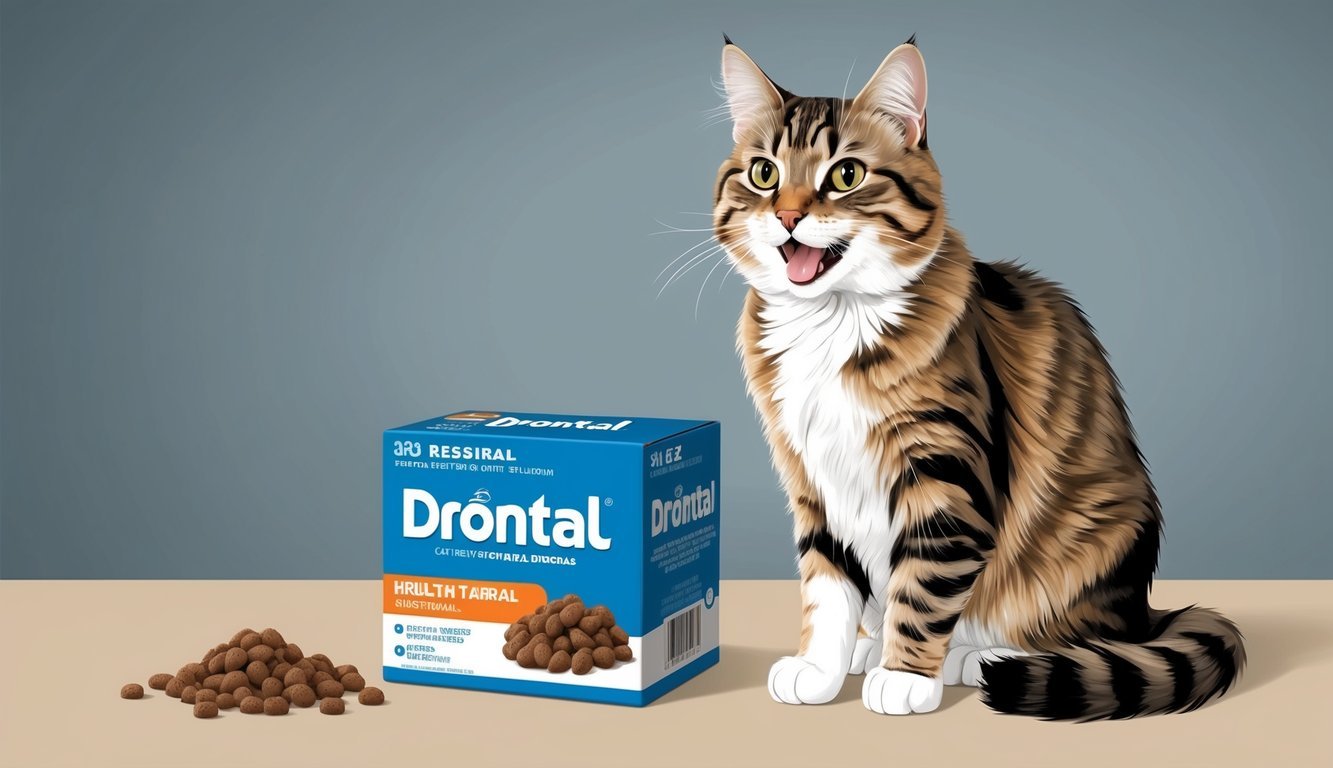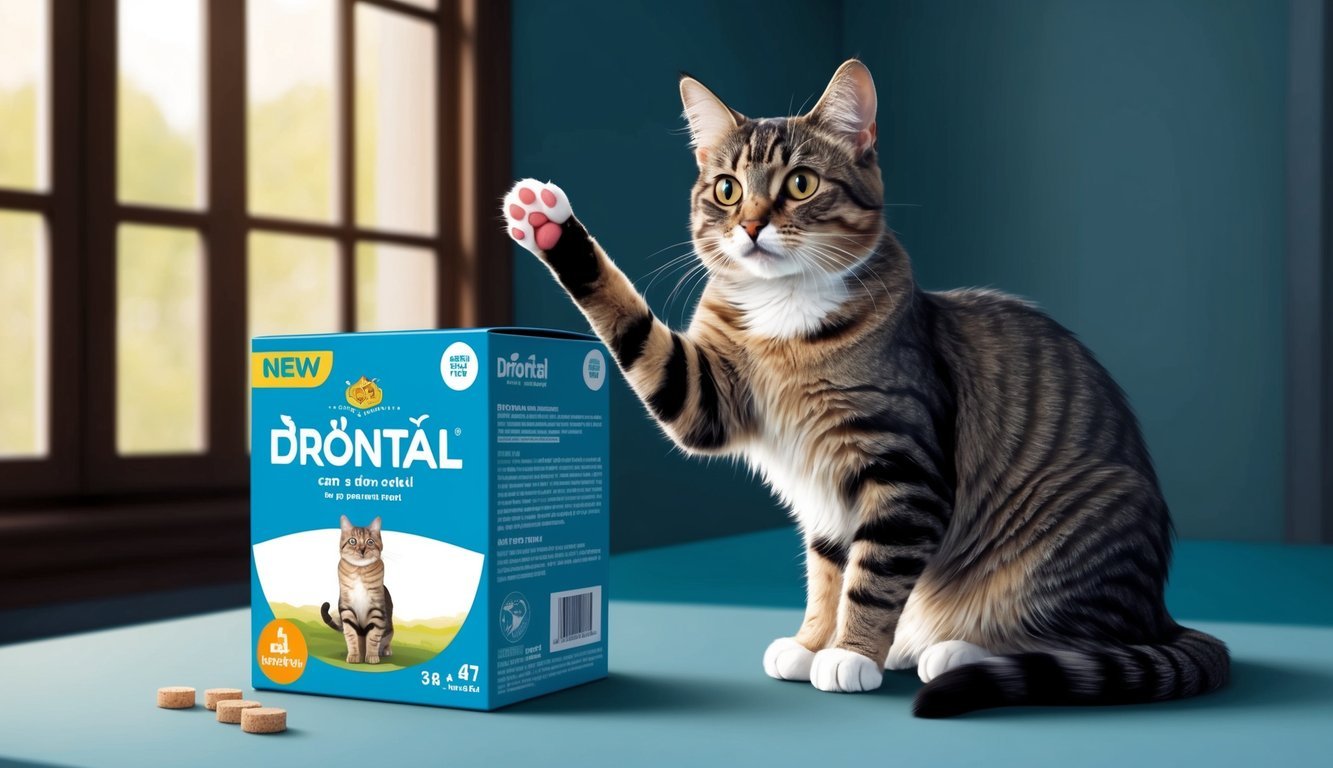Drontal for cats is a widely recommended deworming medication known for its ability to address various intestinal worm infestations.
This broad spectrum dewormer effectively targets tapeworms, hookworms, and roundworms, helping to keep your feline companion healthy and free from these pesky parasites.
If you’re concerned about your cat’s health and want to ensure they live a happy and active life, understanding how Drontal works and how to administer it is essential.
Many cat owners might wonder about the safety and efficacy of this treatment.
Drontal is generally considered safe when used as directed, but knowing potential side effects and how to handle them can make a significant difference.
You’ll also want to learn how to support your cat during treatment and maintain their overall well-being.
With so much information out there, pinpointing the essentials can help you make informed decisions about your cat’s health.
Being proactive about deworming with Drontal can ensure your furry friend remains vibrant and energetic.
Key Takeaways
- Drontal is effective against multiple types of intestinal worms in cats.
- Administering Drontal correctly ensures your cat’s safety and health.
- Understanding potential side effects helps you manage your cat’s treatment journey.
Understanding Drontal for Cats
Drontal is an effective deworming medication designed specifically for cats.
It targets various types of parasites, ensuring your feline friend stays healthy and comfortable.
Let’s explore its composition and the specific parasites it addresses.
Composition and Action
Drontal contains two active ingredients: praziquantel and pyrantel pamoate.
These components work together to eliminate intestinal parasites.
-
Praziquantel effectively combats tapeworms, particularly Dipylidium caninum and Taenia taeniaeformis. It disrupts the worm’s skin, causing it to become paralyzed and disintegrate.
-
Pyrantel pamoate targets hookworms and roundworms. It works by causing the worms to become paralyzed and expel from your cat’s system.
This combination makes Drontal a broad-spectrum dewormer, suitable for various parasitic infections.
Types of Parasites Targeted
Drontal is primarily effective against:
-
Tapeworms: These are flat, segmented worms affecting the intestines. Symptoms may include weight loss and segments of the worm in your cat’s feces.
-
Hookworms: Ancylostoma tubaeforme is a common hookworm in cats. It attaches to the intestinal walls and can cause severe anemia.
-
Roundworms: Toxocara cati is the primary roundworm affecting cats. It can lead to growth issues and digestive problems.
Knowing these parasites helps you understand the importance of regular deworming for your cat’s health.
Administering Drontal
Getting the dosage and administration of Drontal right is essential for effectively treating your cat’s parasitic infections.
Here’s how you can ensure your feline friend receives this dewormer safely and efficiently.
Dosage Guidelines
When it comes to dosage, it’s important to consider your cat’s weight and age.
Drontal tablets are typically given to adult cats every three months.
Kittens can start receiving Drontal at three weeks old.
Here’s a general dosage guideline for cats:
| Weight of Cat | Dosage of Drontal |
|---|---|
| Under 2.2 lbs | Consult your vet |
| 2.2 – 5.5 lbs | ½ tablet |
| 5.6 – 11 lbs | 1 tablet |
| 11.1 – 16.5 lbs | 1 ½ tablets |
Always consult your veterinarian for precise recommendations tailored to your cat’s needs.
Adjustments may be necessary based on your cat’s specific health conditions.
How to Administer Drontal to Cats
Administering Drontal can be done easily, yet it requires care to ensure your cat takes the full dosage.
Follow these steps for a smooth process:
- Prepare: Have the tablet ready and a small amount of water nearby.
- Calm Your Cat: Gently hold your cat, ideally in your lap or on a soft surface, and make sure they are calm.
- Administer the Tablet: Place the tablet at the back of your cat’s tongue, using your fingers to hold their mouth closed for a few moments.
- Encourage Swallowing: You can offer water or favorite treats to help encourage swallowing.
If your cat resists, you might consider using treats or crush the tablet (after consulting your vet) to mix into food.
Always monitor your cat for any side effects after administration.
Possible Side Effects

When administering Drontal to your cat, it’s important to be aware of potential side effects.
While it’s generally safe, some cats may experience mild reactions.
Understanding these can help you ensure your cat remains healthy throughout the treatment.
Common Side Effects
The most frequently reported side effects of Drontal include diarrhea, vomiting, and increased salivation.
These symptoms can arise as your cat’s body reacts to the medication or the expulsion of dying parasites.
- Diarrhea can range from soft stool to more severe cases. It’s vital to monitor the frequency and consistency.
- Vomiting is another possibility, though it might be a reaction to the specific medication.
- Loss of appetite may also occur. If your cat seems less interested in food, keep an eye on their eating habits.
These effects are usually transient and resolve quickly.
Serious Adverse Reactions
While rare, serious adverse reactions can occur.
You should stay vigilant for severe symptoms that may indicate your cat is having a more significant issue.
Signs of a serious reaction could include:
- Persistent vomiting or diarrhea lasting more than a day
- Severe lethargy or unresponsiveness
- Excessive salivation that doesn’t subside
If you notice these, it may indicate an adverse reaction to the medication or an underlying condition that needs attention.
Acting promptly can make a difference.
When to Consult a Veterinarian
If your cat shows any concerning symptoms, reaching out to a veterinarian is advisable.
You should seek veterinary care if you notice:
- Severe or prolonged diarrhea or vomiting.
- A noticeable loss of appetite lasting more than a day.
- Symptoms of an overdose, such as excessive drooling or extreme lethargy.
Your veterinarian can provide guidance tailored to your cat’s specific situation, ensuring their safety and well-being.
Safety and Precautions
When using Drontal for your cat, it’s essential to be aware of possible contraindications, safe storage methods, and the risks of overdose or drug interactions.
Understanding these factors will help you ensure a safer experience for your pet.
Contraindications and Warnings
Before administering Drontal, consider any contraindications.
This medication should not be given to cats that are allergic to its active ingredients.
It’s also not recommended for kittens under six weeks of age or those with severe liver disease.
Monitor your cat for adverse effects, especially if they have existing health concerns.
In safety studies, cats receiving ten times the standard dosage showed signs of vomiting and salivation.
Always consult your veterinarian if you notice unusual symptoms after treatment.
Storing Drontal Safely
Storage is crucial for maintaining the effectiveness of Drontal.
Keep the medication in its original packaging and store it in a cool, dry place, away from direct sunlight.
Ideal storage temperatures typically range between 59°F and 86°F (15°C to 30°C).
Ensure that the medication is out of reach of pets and children.
Avoid exposing it to excessive humidity or heat.
Following these guidelines helps preserve the drug’s efficacy and keeps it safe for your cat’s use.
Drug Interactions and Overdose
Be cautious about potential drug interactions when giving Drontal.
It’s essential to tell your veterinarian about any other medications or supplements your cat is taking.
This includes over-the-counter remedies and herbal products.
In the event of an overdose, symptoms may include excessive drooling, vomiting, or lethargy.
If you suspect your cat has ingested too much, contact your veterinarian or an emergency animal poison control center immediately.
The sooner you act, the better the outcome for your pet.
Effectiveness and Efficacy

Drontal is known for its effectiveness against various parasite infections in cats.
Understanding how it works and what you can expect regarding reinfection and retreatment is essential for maintaining your cat’s health.
Evaluating Efficacy
Drontal targets several common gastrointestinal parasites, including roundworms, hookworms, and tapeworms.
Clinical studies demonstrate that approximately 98% of treated cats were free of parasites within just a week of treatment.
This rapid action makes Drontal a preferred choice among veterinarians.
The inclusion of Praziquantel enhances its efficacy against tapeworms and certain gastrointestinal trematodes.
Administering the medication is generally straightforward, allowing you to easily treat your cat with minimal stress.
Regular veterinary check-ups can help determine if Drontal is necessary, especially if your cat shows symptoms like diarrhea, weight loss, or vomiting.
Reinfection and Retreatment
While Drontal is effective, reinfection is a possibility.
Cats can easily contract parasites again, especially if they have outdoor access or if their environment is contaminated.
Flea control is also crucial, as fleas can host tapeworm larvae that may re-infest your cat.
For cats who require retreatment, it’s advisable to consult with your veterinarian.
They can recommend the appropriate timing for administering another dose, typically three to four weeks after the initial treatment if signs of infection reappear.
Following a scheduled deworming routine may help in minimizing the risk of new infections.
Supporting Your Cat’s Health
Keeping your cat healthy involves regular check-ups, supporting their immune system, and maintaining a safe environment.
These practices can prevent the onset of health issues and improve your cat’s overall well-being.
Regular Fecal Exams
Regular fecal exams are essential for detecting internal parasites like roundworms and tapeworms.
These parasites can cause serious health problems for your cat.
Schedule a fecal exam at least once a year with your veterinarian to catch any parasites early.
What to Expect:
- Sample Collection: Collect a fresh stool sample using a clean container.
- Diagnosis: Your vet will analyze the sample under a microscope.
If parasites are present, your vet may recommend treatments like Drontal to help eliminate them.
Boosting Immune System
A robust immune system helps your cat fight off illnesses and infections.
You can enhance your cat’s immune health through proper nutrition and regular vet visits.
Nutrition Tips:
- Choose high-quality cat food rich in essential vitamins and minerals.
- Incorporate omega-3 fatty acids to support skin and coat health.
Consider asking your vet about supplements like probiotics, which can promote gut health and enhance immunity.
Maintaining a Parasite-Free Environment
Keeping your home free of parasites is crucial for your cat’s health.
Fleas and ticks can cause discomfort and may carry diseases.
Preventative Measures:
- Regularly vacuum your home to eliminate flea eggs and larvae.
- Wash your cat’s bedding weekly in hot water.
- Consider using veterinarian-recommended flea treatments.
Additionally, maintain your yard by regularly mowing the lawn and removing debris where fleas can thrive.
A clean environment significantly reduces the risk of parasite infestations, keeping your cat safe and healthy.
Professional and Home Care
managing your cat’s deworming process requires both professional veterinary support and effective home care.
Knowing how to navigate these areas will help ensure your cat remains parasite-free.
Veterinary Clinics and Support
When dealing with parasitic infections in your cat, starting at a veterinary clinic is crucial.
A vet will diagnose the specific type of worms affecting your pet, ensuring that you receive the right deworming medication, such as Drontal.
Your veterinarian can also provide guidance on proper dosage based on your cat’s weight and health condition.
They may recommend follow-up appointments to monitor your cat’s recovery and ensure the effectiveness of the medication.
If your cat experiences side effects, your vet is your best resource for management and support.
They can provide valuable insights into preventing reinfection, which may involve grooming tips and flea control measures.
Home Care After Deworming
After administering the deworming medication, it’s essential to focus on home care to maximize effectiveness.
Keep your cat’s environment clean by regularly washing bedding and vacuuming carpets to eliminate any lingering eggs or larvae.
Monitor your cat for any adverse reactions following treatment, such as vomiting or diarrhea.
If these occur, consult your veterinarian promptly.
You should also adjust your cat’s diet temporarily by providing easily digestible food to help their digestive system recover.
Maintain regular grooming habits to minimize the risk of reinfection from fleas, which are often a vector for tapeworms.
Product Information

When it comes to managing your cat’s health, Drontal is a widely recognized* broad-spectrum dewormer* specifically formulated for felines.
It effectively targets various intestinal parasites, ensuring your pet stays comfortable and healthy.
Here’s what you need to know about the product range and where to purchase it.
Drontal Product Range
Drontal for cats contains active ingredients like praziquantel and pyrantel pamoate.
These ingredients work together to eliminate common parasites, including tapeworms, hookworms, and large roundworms.
Drontal is available in tablet form, making it easy for you to administer to your cat.
You can find it in different package sizes to suit your needs.
Here’s a quick look at common variations:
| Product | Dosage |
|---|---|
| Drontal Tablets for Cats | Varies by weight |
| Drontal for Kittens | Recommended for ages 4, 6, 8, and 12 weeks |
Always ensure you follow the recommended dosage based on your cat’s weight to maintain effectiveness and safety.
Where to Buy Drontal
You can find Drontal for cats at various retail locations, including pet stores and online platforms.
Common retailers that stock Drontal include:
- Local Veterinary Clinics: Often the best source for quality assurance.
- Pet Supply Stores: Many carry it in stock along with other feline care products.
- Online Retailers: Websites like Amazon or Chewy typically offer convenient purchasing options.
When buying online, check for authorized sellers to ensure you are getting a genuine product.
Prices usually range from $20 to $30 depending on the retailer and package.
Frequently Asked Questions

Drontal is a widely used dewormer for cats, and many pet owners have questions about its use.
This section addresses common inquiries regarding dosage, effects, side effects, and more.
How often should I administer Drontal to my kitty?
For adult cats, Drontal is typically given every three months.
However, the specific frequency can vary based on your cat’s health status and lifestyle.
Always consult your veterinarian for a personalized schedule.
What exactly does Drontal do for our feline friends?
Drontal is designed to treat common intestinal parasites in cats, including roundworms, hookworms, and tapeworms.
It works by disrupting the worms’ metabolism, leading to their elimination from your cat’s system.
Do I need a vet prescription to purchase Drontal for my cat?
You don’t necessarily need a prescription to buy Drontal for cats.
It’s available over-the-counter in many places.
Nonetheless, it’s best to consult your veterinarian before administering any treatment.
Are there any side effects I should watch out for after giving my cat Drontal?
Some cats may experience mild side effects, such as vomiting or diarrhea, after taking Drontal.
Monitor your cat closely, and if you notice any unusual symptoms, contact your vet promptly.
How quickly can I expect Drontal to work against worms in cats?
Drontal typically begins working within a few hours of administration.
However, the full effect may take a couple of days to observe as the parasites are expelled from your cat’s system.
Can I get Drontal for my cat in a liquid form?
Drontal is primarily available in tablet form for cats.
Liquid formulations are generally not offered, but always check with your veterinarian for the best option for your pet.

